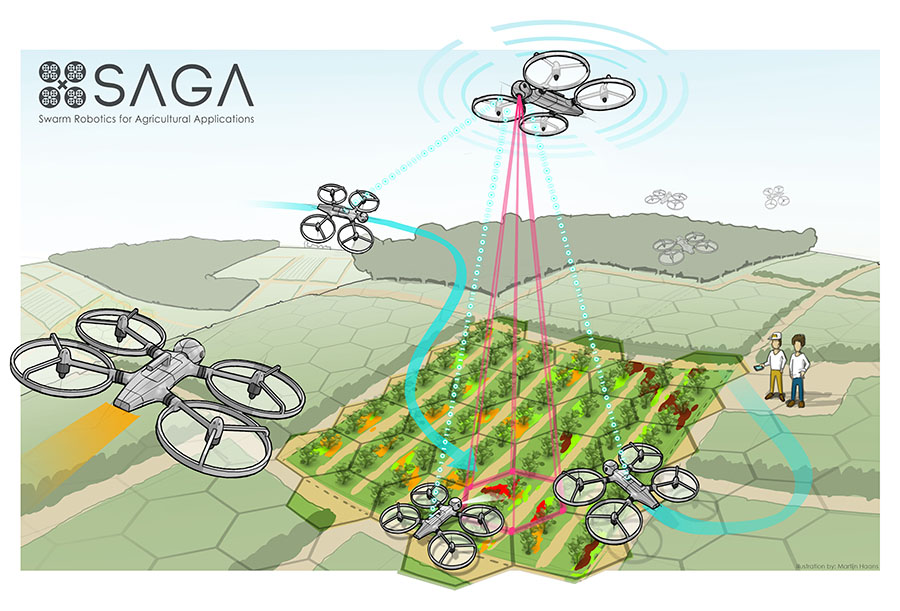
Robohub.org
EU-funded robotics technology experiments present their work at Hannover Messe
 From 24 – 28 April, four ECHORD++ experiments will present their work at Hannover Messe, the world’s biggest trade show. You can see the latest advances in EU-funded robotics technology development in Hall 17, stand C70, and get the chance to develop your own ideas with their on-site competition.
From 24 – 28 April, four ECHORD++ experiments will present their work at Hannover Messe, the world’s biggest trade show. You can see the latest advances in EU-funded robotics technology development in Hall 17, stand C70, and get the chance to develop your own ideas with their on-site competition.
The four running experiments are:
CoCoMaps, Collaborative Cognitive Maps, uses an expanded version of the existing Cognitive Map Architecture implemented on Honda’s ASIMO robot in an environment with more complex tasks than already attempted. This will allow the robot to interact in more complex ways, in particular, to simultaneously interact with another robot and more than one person at a time. Thus, the project aims for a group of 2 robots and 2 humans enabling social interactions that can coexist with the robots’ attention to – and completion of – practical tasks in the workplace. CoCoMaps is conducted by the artificial intelligence and software experts of CMLabs in Great Britain together with the Icelandic Institute for Intelligent Machines (IIIM) in Reykjavik.
Flexsight, Flexible and Accurate Recognition and Localisation System of Deformable Objects for Pick&Place Robots, aims to provide a robotic solution for the “pick&place” class of applications with rigid and deformable objects. The project focuses on building a prototype of a smart camera – the FlexSight Sensor (FSS) – which can be integrated in the chassis of an existing robot to empower it with detection and localisation capabilities. Sapienza University of Rome forms the consortium together with the companies Robox and IT+Robotics.
HyQ-REAL, from the research lab to the real world, will bring the four-legged HyQ2Max robot from the laboratory to real world applications. HyQ2Max is an improved version of HyQ, a robot that has demonstrated a wide repertoire of indoor/outdoor motions ranging from running and jumping to careful walking over rough terrain. The project partners are the Istituto Italiano di Tecnologia (IIT) in Genova and the British company MOOG, the world leader in reliable, high-performance actuation systems for aerospace and motorsport.
SAGA, Swarm Robotics for Agricultural Applications, is a joint project of the Institute of Cognitive Sciences and Technologies in Rome, Wageningen University in the Netherlands and the Dutch drone manufacturer avular. The goal of the experiment is to prove the applicability of swarm robotics to precision farming, in particular, to use a group of small unmanned aerial vehicles (UAVs) to collectively monitor a sugar beet field and cooperatively map the presence of volunteer potatoes, which are a major threat as they spread diseases (e.g., late blight) and facilitate harmful soil nematodes.
Win a 6-week collaboration at their Robotics Innovation Facilities
Visitors also have the chance to win one of three 6-week collaborations at one of their Robotic Innovation Facilities, including travel costs up to 1.000€ to one of the ECHORD++ RIFs. The RIFs located in Bristol (UK), Paris (FR) and Pisa (IT) provide State-of-the-Art robotic hardware and software, as well as scientific and technical support while safeguarding your intellectual property. The RIFs can help turn robotics idea into Proof of Concept. The winners will be announced at the ECHORD++ stand on Thursday 28th at 16.00.
Get a peek inside the Robotics Innovation Facilities, their technical equipment, application domains and services in their video:
About ECHORD++ (The European Coordination Hub for Open Robotics Development)
The aim of ECHORD++ is to strengthen the knowledge transfer between scientific research, industry and users in robotics and to stimulate their cooperation. The EU-funded project with a runtime of five years (2013 – 2018) funds small-scale research projects called experiments, Public end-user Driven Technological Innovation (PDTI) and established Robotics Innovation Facilities (RIFs), open labs providing state-of-the-art robotic hardware and software as well as scientific and technical support. For further information, please visit www.echord.eu
tags: c-Research-Innovation, cx-Events, ECHORD++




